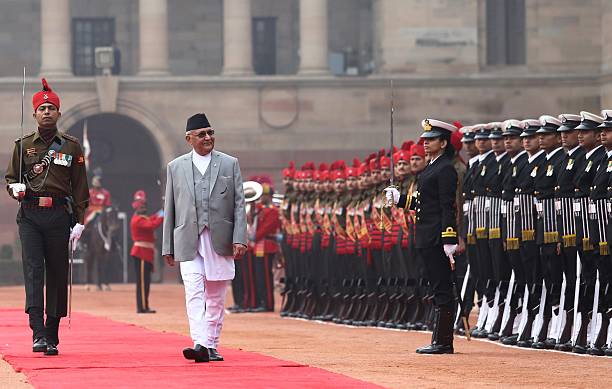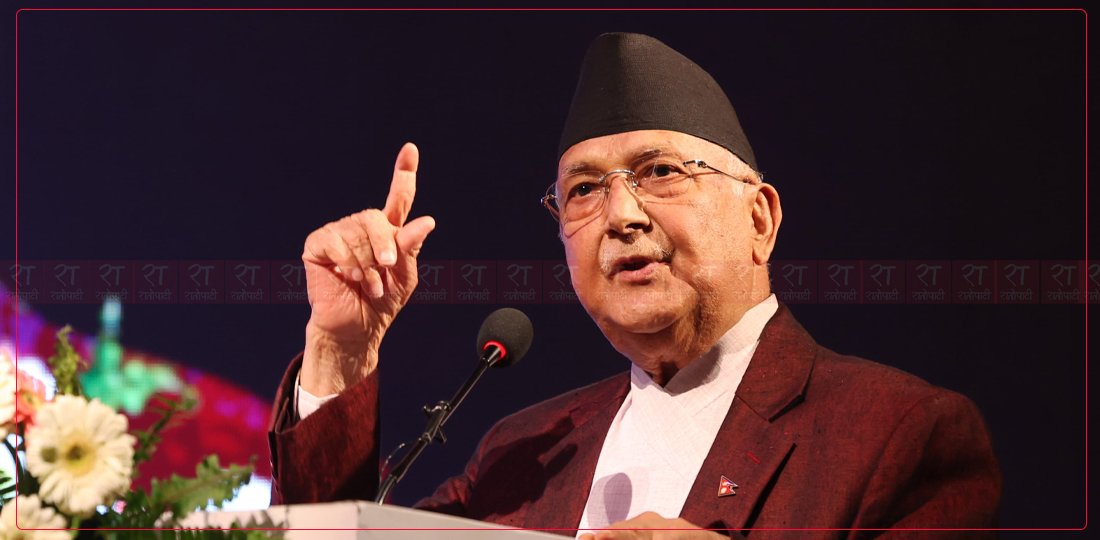On PM's India Visit

The Prime Minister Oli is visiting India this week. His official visit will commence from 5th April. His most awaited visit has to face the consequences of the Litmus Test of his kind of 'nationalist-patriotic' image he has garnered in the recent years as he has finished packing up for the India visit. The firm stands he had held during the Indian sponsored Blockade of 2015 have been translated into the Government of absolute majority at the center, provincial and the local levels.
In addition, the PM Oli has actually scored the enough points to place him in the club of the most powerful executive head of the country-unlike his predecessors i.e. those who have only been successful for clownishly maintaining the status quo without any aggressive policy interventions for the promotion and augmentation of the prestige of the country and the fellow citizens.
Futermore, his visit has been assumed as the breakthrough on enhancing and enriching the Nepal-India bilateral and the multi-lateral issues benefitting both the nations for the long term socio-economic growth, political stability and the most sought after peace across the South Asian region. The obvious reason of the expectations of such degree has the authentic moral ground-he is the only PM with such paramount power entrusted by the majority upon his vision for the prosperous Nepal.
So, now is the time to keep his promises on behalf of the country ridden with more than half a century long instability and her poverty-stricken people. The PM Oli is one of such politicians whose socio-economic ground was very vulnerable, who forged himself into a mature politician in course of time. He has also proved himself capable; he believes that actions must speak louder than words.
Hence, the curious eyes from the coalition partners and opposite spectrum are on words and deeds he engenders at the moment. His apparent rhetorical prowess, quizzical yet witty terms and political grandiloquence too must produce some visible outcomes during the visit since the history has endowed him with such a strategic political loci in which has not many options for deferring the required timely decisions for actions. Had he not promised abundant during the recent elections, he would not have worried much. His promise of reinstallation of peace and prosperity through socio-political stability to his prospective voters should not be misunderstood, led stray or maneuvered for any unpleasant actions against the impressive decision of the recent plebiscite.
Indeed, Nepal stands in regionally bipolar and globally multiporal world today. If she does not have wealth and military might enough to protect herself from the foreign aggressions of any characters, she can and will defend herself through the power of diplomacy and the content of the non-isolationist approach.
Not to mention, the present era forcibly demands that the state of India, now, should purge herself from the prejudicial perspectives over Nepal. Rather, she, more importantly, should not trivialize the PM Oli just as another Prime Minister of one of the poorest republics of the world which is financially unguarded, militarily spineless and socially mercurial. His country might be weaker in many repects, however, he represents a sovereign country which is one of the chief players of the international political, cultural, economic and social organizations at the global level. Some of the globally reputed organizations of which Nepal has been maintaining membership as well as contributing in close liasion, accountably, with are ADB, BIMSTEC, CD, CP, FAO, G-77, IAEA, IBRD, ICAO, ICC (NGOs), ICRM, IDA, IFAD, IFC, IFRCS, ILO, IMF, IMO, Interpol, IOC, IOM, IPU, ISO, ITSO, ITU, ITUC (NGOs), MIGA, MINURSO, MINUSMA, MINUSTAH, MONUSCO, NAM, OPCW, SAARC, SACEP, UN, UNAMID, UNCTAD, UNDOF, UNESCO, UNIDO, UNIFIL, UNMIL, UNMISS, UNOCI, UNTSO, UNWTO, UPU, WCO, WFTU (NGOs), WHO, WIPO, WMO, WTO among others. The treatments India undertakes for executing responsibly the bilateral agreements made between two nations have already been included among the cases of dicussions among the top global agenda now.
Additionally, the above mentioned organizations have been granted access to operate their institutional projects in order to achieve their goals conveniently. Recently, Nepal has also scored remarkable diplomatic victories in various global political fora. So, he must possess the audacity to put the bilateral core concerns of Nepal and India relations with perfect priority basis.
Under these circumstances, the best policy of Nepal towards India only means that Nepal should control the strategic decisions for the varied projects to be undertaken by Nepal. The time when any diplomats from any so-called powerful countries visit Nepal and get us to assist them so that their developments projects to be implanted on Nepalese soil just for their benefits must be undone.
Likewise, the time when that same people in diplomatic guise, knowing that we are poor in technologies and technocrats, can send foreign technocrats in Nepal, and get us to support their vested interests so that they can wildly abuse our natural resources as well as human resources with the pretexts that Nepal needs developments, those wily foreign approaches have to be busted sooner rather than later.
As the paramount head of the Government of the country, the PM Oli must understand the most basic ingredients of the Nepalese foreign policy measures and the tools to implement them. He must know what patterns of diplomacy is supposed to produce for the excellent implications of the national foreign policy. He and his immediate advisory team must hold what part real diplomacy plays on our favor among the international community. And until we are not strategically advanced and diplomatically tactful, we will always be misled and beguiled into supporting the coveted strategies of some other countries which have no good of Nepal at heart.
Thus, the philosophy of Nepalese foreign policy only means that Nepal will have to carry on the artful diplomatic dealings based on the revised version of pro-Nepalese foreign policy by becoming more conscious as well as mature in bilateral and multilateral transactions in the world political arena. The paradigm shifts of our foreign policy principles via realistic and pragmatist approaches will yield the most desired results on behalf of the nation and her people.
The Nepal-India relations must be based upon the basic universal norms and values of the international law, conventions, international human rights, equality, rules of law, indepenent judiciary, freedom of expression, freedom of press, balance of power, welfare state among others. These have also been the shared values of both of the countries. Since we are in the 21st century world, we must enrich the values quite compatible to the oue time and contexts.
If truth be told, there must not be any hostile interactions on any of the vital issues that make much sense in the real life situations of the citizenry of Nepal and India equally. The crucial and shared problems concerning poverty, inequality, unemployment, illiteracy etc. can only be mitigated if, and only if, both the nations and their governments come together to the table of negotiations as equal sovereigns. India and her institutions must forsake the myth of Big Brotherhood and Big Fish in the region. The alleged unwelcome micro-managements or other unbidden muddling of the internal affairs of Nepal have to abandoned by India. In fact, there have multitudinous but mutually advantageousl affairs pertaining to Nepal and India.
Long live Nepal - India relation!









Leave Comment